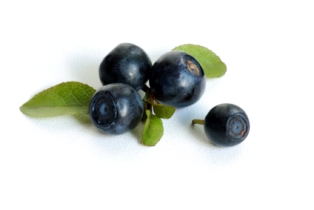Get Your ŌĆśBilŌĆÖ Fill
French Study Finds Bilberries Prevents Hardening of Arteries
A berry thatŌĆÖs rarely heard from is making headlines in America today, as a recent study suggests that the sibling to the blueberry can help prevent arteries from hardening, potentially protecting people from the most common health problem in the world today.
If youŌĆÖre at all familiar with the movie Willy Wonka and the Chocolate Factory, then you know all about the new and interesting places, thingamabobs and taste sensations Charlie Bucket and company learn about while there.┬Ā Places like Oompa Loompa Land, thingamabobs like Egg-de-cators and taste sensations like snozberries (Said one Veruca Salt, ŌĆ£Snozberry?┬Ā What on earth is a snozberry!ŌĆØ).┬Ā Well, bilberries are a lot like snozberriesŌĆölesser-known, but unlike the snozberry, they actually exist.
As aforementioned, bilberries are related to blueberries in taste, texture and class (both come from the same genus class of species called Vaccinium).┬Ā And again, similar to blueberries, theyŌĆÖre chock-full of antioxidants called anthocyanins, which are widely praised for their disease-fighting prowess.
While unfamiliar to most people in the Western world, bilberries arenŌĆÖt hard to come by in Europe; theyŌĆÖre as plentiful to European fields as corn is to American fields.┬Ā Norway, Finland, Sweden and the United Kingdom region produce copious amounts of bilberries on publicly accessible land, which is to say that anyone and everyone can ŌĆ£come and get ŌĆśemŌĆØ as they please.┬Ā And after this most recent finding, itŌĆÖs not unreasonable to think thereŌĆÖll be even more people coming out of the woodwork to scoop up these berry beauties.
French scientists fed three groups of mice the same control diet for 16 weeks, but two of the groups received varying amounts of bilberry extract in addition.┬Ā After four months of observation and testing, markers associated with atherosclerosis were significantly less in the two groups fed bilberry extract (i.e. markers=plaque buildup in the arteries).┬Ā For example, in comparison to the group not fed the bilberry extract, one group saw a 25 percent reduction in plague buildup, while another saw a 36 percent reduction.
The study is published in the Journal of Agricultural and Food Chemistry.
As per usual, the researchers downplayed the results, saying more research needs to be done before the findings can be extrapolated.┬Ā But lest we forget, this isnŌĆÖt the bilberryŌĆÖs first road show; others studies have found them to be effective in treating degenerative diseases relating to arthritis and macular degeneration.
Bilberries are hard to come by in the states.┬Ā ThereŌĆÖs a select few places that sell bilberries in the Western half of the country where theyŌĆÖre often used in jams and jellies.┬Ā ThatŌĆÖs not to say theyŌĆÖre not available.┬Ā They are, but in supplement form.
Health food stores like GNC and The Vitamin Shoppe should carry plenty of bilberry supplements, where bilberry is the primary ingredient, or where it is an added ingredient.┬Ā The amount of bilberry used will depend on the product, but if possible, opt for one thatŌĆÖs at least 25 percent anthocyanocides.
Sources:
nutraingredients.com
wisegeek.com
naturalhealthontheweb.com
en.wikipedia.org
Related Posts
No related posts.
 
|
Enjoy this article? We guarantee your privacy. Your email address will NEVER be rented, traded or sold. |
Visit my new site: Self Help On The Web
 |
 |
Posted: November 9th, 2009 under Atherosclerosis.
Tags: anthocyanocides, bilberries, bilberry, bilberry extract







